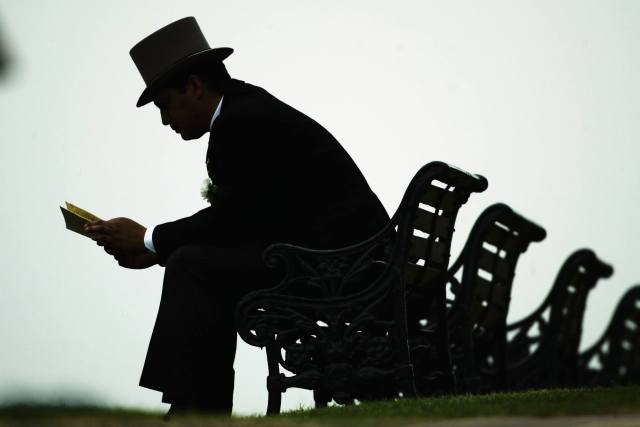
A wasp is an insect of the order Hymenoptera. A WASP, on the other hand, is an American term that stands for White Anglo-Saxon Protestant. However, it’s not just anyone who ticks those particular boxes who qualifies for membership. In a column for the New York Times, Ross Douthat explains the specifics:
“The term properly refers to a specific kind of American elite, mostly from the Northeast, mostly high-church Protestants, concentrated in a few cities (Boston, Philadelphia, New York, plus some Midwestern and Californian outposts), generally associated with the Republican Party (with occasional defectors like F.D.R.), who dominated a particular set of fields (academia, finance, foreign policy) and shared the code of service and piety and manners that defined the elder Bush’s career.”
So, what we’re talking about is a ‘born-to-rule’ social elite – not so much the wasps of the American hive as the queen bees (only male, of course).
Arguably the late George HW Bush was the last WASP President (his son, George W Bush, being too Texan to qualify). In a previous column, Douthat not only mourned the passing of Bush Senior, but also expressed a degree of regret for the decline of the WASP establishment. This being the social media age, his intent was interpreted in the worst possible way – “as a paean to white privilege, even a brief for white supremacy”.
That’s not what he meant at all. In fact, he says that the diversification of America’s elites is both “good and necessary”. However, in his view, that does not mean that the same applies to meritocracy:
“…ideals of diversity and meritocracy are two different ways of shaping an elite, which can advance together but which are just as often separable, or even in tension with each other… And I would separate them. “
He goes on to argue that the newly diversified upper class was “unwise to abandon an aristocratic self-conception in favor of a meritocratic one”.
I don’t think he gives a convincing account of how diversity – or just plain old-fashioned fairness – can advance without what he calls a “meritocratic organising theory”. Is he really suggesting that the hopes and ambitions of the outsider should depend on the special favour of the insider? After all, we can’t all be Meghan Markle.
He’s also on shaky ground when talking about the “sense of duty, self-restraint and noblesse oblige that WASPs at their best displayed”.
The words “at their best” are doing an awful lot of work there. Yes, one can discern a tradition of duty in various aristocratic histories, but one can also discern a record of snobbery, exploitation and violence.
However, when it comes to the self-defeating tendencies in the meritocratic model, Douthat is spot on:
“…meritocracy segregates talent rather than dispersing it. By plucking the highest achievers from all over the country and encouraging them to cluster together in the same few cities, it robs localities of their potential leaders — so that instead of an Eastern establishment negotiating with overlapping groups of regional elites (or with working-class or ethnic leaders), you have a mass upper class segregated from demoralized peripheries.”
The British parallels are obvious. Over the course of the 19th and 20th centuries, the government of the UK became ever more meritocratic (and democratic), but also ever more centralised, with power sucked out of the “provinces” and into Westminster and Whitehall. The disempowerment of the great industrial cities has had an especially deleterious effect. But because of the increasing diversity of the individuals pulling the strings from London, the geographical imbalance of power was legitimated.
Another excellent point is that an aristocratic elite at least knows what it is. A meritocratic elite, on the other hand assumes that it has earned, not inherited its privilege. In the socially mobile decades of the 20th century – the era of ‘room at the top’ – when the professional and managerial classes were rapidly expanding, that was very often true. Indeed, one of the reasons for the end of the aristocratic order was that there weren’t enough of the old elite to fill the positions available in the new elite.
That era of expanding opportunity is over. Today, the graduates (as they invariably are) starting out on the choicest career paths are increasingly likely to be the children of those who did the same a generation ago. Most of them will have grown up with every expectation that they’d go to university, and the benefit of a private or good state school education. By one mechanism or another, a good position in the meritocracy is now substantially inherited.
Obviously the new elite is much bigger and, to some extent, more diverse than the old elite – but, crucially, it doesn’t recognise its own privilege. In using its position of power to arrange matters to its advantage, it has little sympathy for those who feel left out. In theory, the benefits of the globalised, liberal order are open to everyone, so no one has cause to complain.
With little sense of its own identity, the not-so-meritocratic elite lacks the ability to see itself as others might see it. If you don’t understand that you’re on the inside, then you won’t realise that there’s an outside. Furthermore, if you don’t recognise how your privilege is perpetuated, then the idea that it could, one day, be interrupted won’t occur to you.
In Britain and America, the old establishment had an understanding of its vulnerability and adapted through political reform. The most dangerous thing about the new establishment is that it takes its continued existence for granted.










Join the discussion
Join like minded readers that support our journalism by becoming a paid subscriber
To join the discussion in the comments, become a paid subscriber.
Join like minded readers that support our journalism, read unlimited articles and enjoy other subscriber-only benefits.
Subscribe